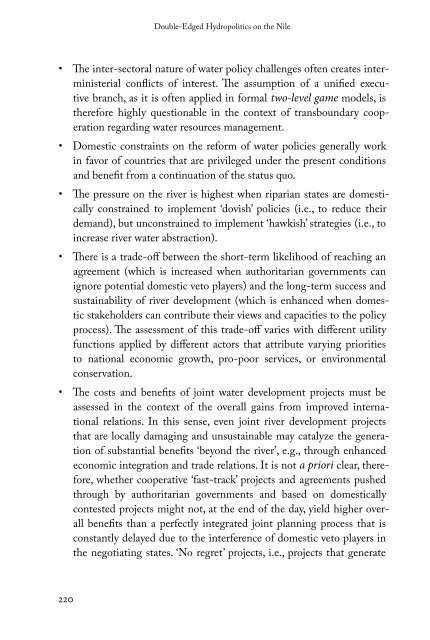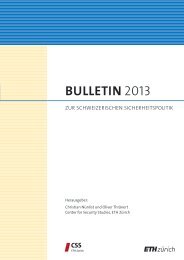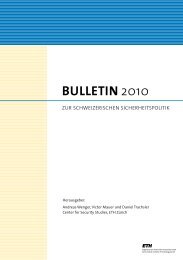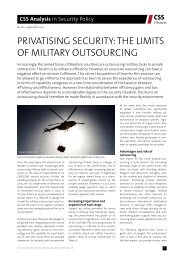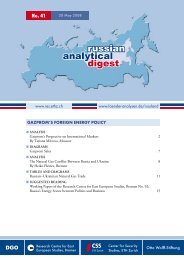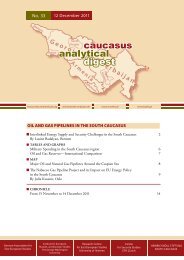Double-Edged Hydropolitics on the Nile - Center for Security Studies ...
Double-Edged Hydropolitics on the Nile - Center for Security Studies ...
Double-Edged Hydropolitics on the Nile - Center for Security Studies ...
Create successful ePaper yourself
Turn your PDF publications into a flip-book with our unique Google optimized e-Paper software.
<str<strong>on</strong>g>Double</str<strong>on</strong>g>-<str<strong>on</strong>g>Edged</str<strong>on</strong>g> <str<strong>on</strong>g>Hydropolitics</str<strong>on</strong>g> <strong>on</strong> <strong>the</strong> <strong>Nile</strong><br />
• The inter-sectoral nature of water policy challenges often creates interministerial<br />
c<strong>on</strong>flicts of interest. The assumpti<strong>on</strong> of a unified executive<br />
branch, as it is often applied in <strong>for</strong>mal two-level game models, is<br />
<strong>the</strong>re<strong>for</strong>e highly questi<strong>on</strong>able in <strong>the</strong> c<strong>on</strong>text of transboundary cooperati<strong>on</strong><br />
regarding water resources management.<br />
• Domestic c<strong>on</strong>straints <strong>on</strong> <strong>the</strong> re<strong>for</strong>m of water policies generally work<br />
in favor of countries that are privileged under <strong>the</strong> present c<strong>on</strong>diti<strong>on</strong>s<br />
and benefit from a c<strong>on</strong>tinuati<strong>on</strong> of <strong>the</strong> status quo.<br />
• The pressure <strong>on</strong> <strong>the</strong> river is highest when riparian states are domestically<br />
c<strong>on</strong>strained to implement ‘dovish’ policies (i.e., to reduce <strong>the</strong>ir<br />
demand), but unc<strong>on</strong>strained to implement ‘hawkish’ strategies (i.e., to<br />
increase river water abstracti<strong>on</strong>).<br />
• There is a trade-off between <strong>the</strong> short-term likelihood of reaching an<br />
agreement (which is increased when authoritarian governments can<br />
ignore potential domestic veto players) and <strong>the</strong> l<strong>on</strong>g-term success and<br />
sustainability of river development (which is enhanced when domestic<br />
stakeholders can c<strong>on</strong>tribute <strong>the</strong>ir views and capacities to <strong>the</strong> policy<br />
process). The assessment of this trade-off varies with different utility<br />
functi<strong>on</strong>s applied by different actors that attribute varying priorities<br />
to nati<strong>on</strong>al ec<strong>on</strong>omic growth, pro-poor services, or envir<strong>on</strong>mental<br />
c<strong>on</strong>servati<strong>on</strong>.<br />
• The costs and benefits of joint water development projects must be<br />
assessed in <strong>the</strong> c<strong>on</strong>text of <strong>the</strong> overall gains from improved internati<strong>on</strong>al<br />
relati<strong>on</strong>s. In this sense, even joint river development projects<br />
that are locally damaging and unsustainable may catalyze <strong>the</strong> generati<strong>on</strong><br />
of substantial benefits ‘bey<strong>on</strong>d <strong>the</strong> river’, e.g., through enhanced<br />
ec<strong>on</strong>omic integrati<strong>on</strong> and trade relati<strong>on</strong>s. It is not a priori clear, <strong>the</strong>re<strong>for</strong>e,<br />
whe<strong>the</strong>r cooperative ‘fast-track’ projects and agreements pushed<br />
through by authoritarian governments and based <strong>on</strong> domestically<br />
c<strong>on</strong>tested projects might not, at <strong>the</strong> end of <strong>the</strong> day, yield higher overall<br />
benefits than a perfectly integrated joint planning process that is<br />
c<strong>on</strong>stantly delayed due to <strong>the</strong> interference of domestic veto players in<br />
<strong>the</strong> negotiating states. ‘No regret’ projects, i.e., projects that generate<br />
220


